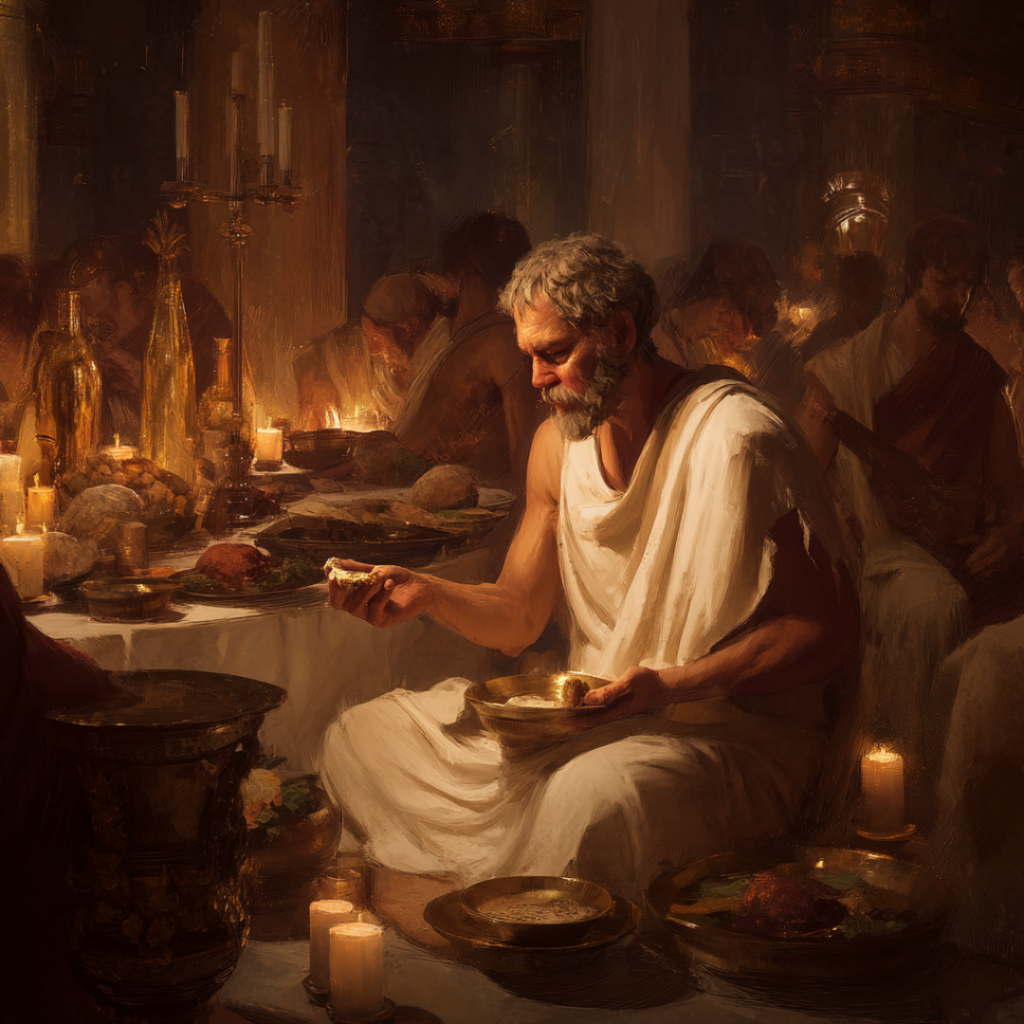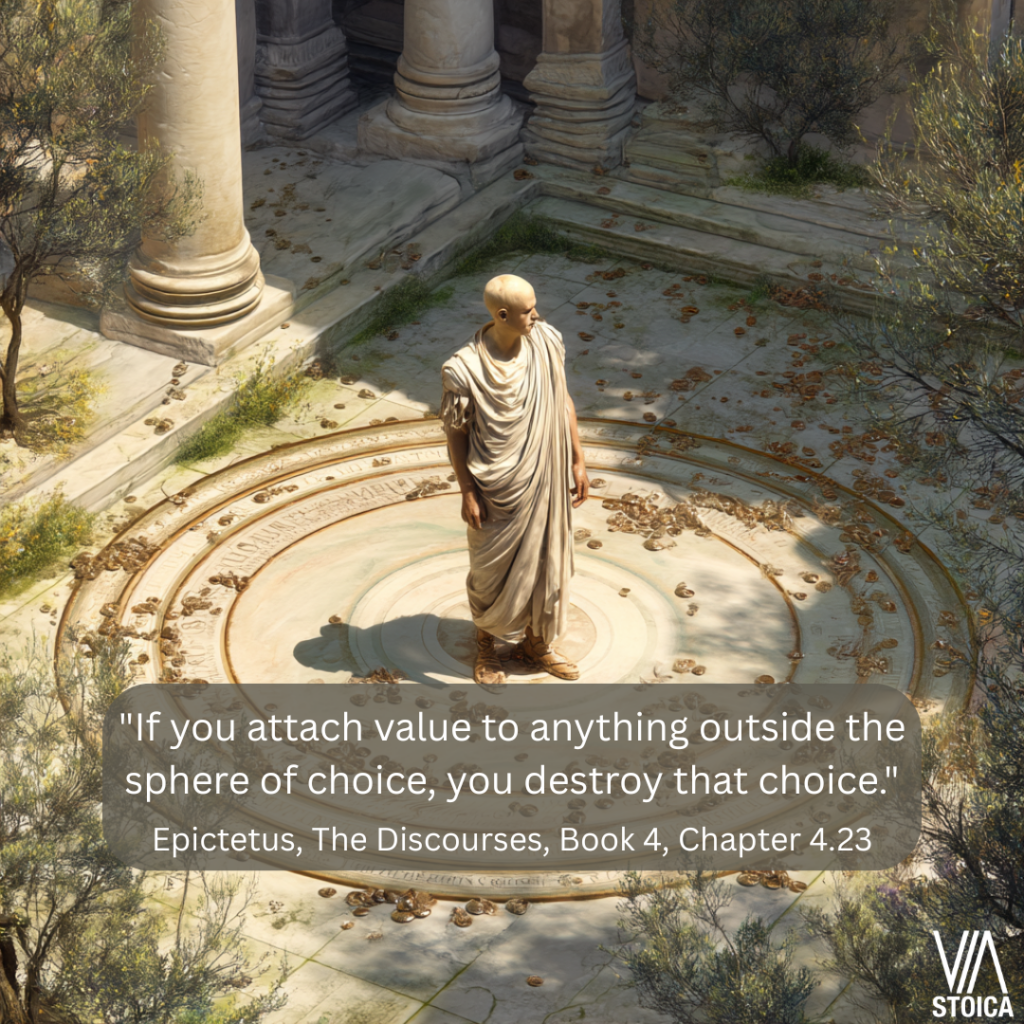What is within our control?

This simple question lies at the heart of Stoic philosophy, and no Stoic addressed it more directly than Epictetus. A former slave turned philosopher, Epictetus taught that the key to peace and freedom lies in focusing only on what we can control and letting go of everything else. That’s why we have selected 10 Epictetus quotes on control and how we can focus on what truly matters.
In a world full of chaos, anxiety, and endless distractions, Epictetus’ words are more relevant than ever. Below are ten of his most powerful and practical quotes on control, each followed by a reflection and a Stoic practice you can try.
1. What is up to you?
“Some things are up to us and some are not.”
Epictetus, The Handbook, 1
This is how Epictetus begins his handbook for living. It sets the tone for everything else. You cannot control what others say, what the weather does, or how the world turns. But you can control your opinions, your desires, and your actions. Recognizing this difference is the foundation of Stoic peace.
With this phrase in mind, you can start to see the world around you differently. Practicing this daily will help you recognize what lies within your sphere of control and beyond it. The beauty of it is that you’ll realize that you can let go of far more things than you thought before. It’s not only a practice of control but just as much about letting go.
Practice: Reflect on your day by looking back at one thing you couldn’t control and one thing you could. How does this change your perspective on those events?
2. Your judgments disturb you
“It is not the things themselves that disturb people but their judgements about those things.”
Epictetus, The Handbook, 5
We often blame circumstances for our emotional turmoil, but Epictetus reminds us that our interpretation is what causes distress. A traffic jam is just a traffic jam. It becomes frustrating only when we think it should not be happening. Take rain, for example. A farmer who hasn’t had any rain will welcome it as a gift from the gods, while if I had a lovely walk planned and it starts raining, I will curse it.
Things that happen around us aren’t good or bad, those are labels we place on them. The Stoics remind us that not even death is a bad thing. It’s a natural occurrence in nature. How can this natural cycle be bad if it happens all around us? What makes it bad is our judgment that we should live on forever.
Practice: When something bothers you today, pause and ask, “Is it the thing, or my opinion of it?”
3. Make the best use of what’s in your power
“Make the best use of what is in your power, and take the rest as it naturally happens.”
Epictetus, The Discourses, Book 1, Chapter 1.17
You cannot control outcomes, but you can control doing your best. You cannot guarantee success, but you can act with integrity. Let your energy go toward what is yours to shape.
When we learn to make this distinction, of what’s in our power and what isn’t, we can focus our attention and energy where it is needed the most. Instead of trying to force events to go our way, we can become better at adapting and preparing ourselves. Not focusing on the end result, but on how we show up, will remove a lot of the friction.
Practice: Choose one task today and approach it with full attention, letting go of the result.
4. Your Life will go smoothly

“Do not ask things to happen as you wish, but wish them to happen as they do happen, and your life will go smoothly.”
Epictetus, The Handbook, 8
This quote challenges our modern mindset. Instead of resisting reality, Stoicism invites us to align with it. Acceptance is not resignation, it is wisdom in action.
The term Amor Fati, as popularized by Nietzsche, comes back at the core of this quote. The more we wish for things, the more things will turn out differently. But if we can welcome what is happening as the way it should happen, then we will fall in line with nature. This way we will flow along instead of trying to swim against the current.
Watch the Via Stoica Podcast episode on this quote on YouTube. Watch it here.
Practice: The next time something unexpected happens, say silently, “This too is part of life.”
5. No Man is Free, Unless…
“For freedom is not secured by the fulfillment of people’s desires, but by the suppression of desire.”
Epictetus, Discourses, Book 4, Chapter 1.175
Understanding these 10 Epictetus quotes on control is understanding what it means to be free. We often relate freedom to how much money we have or whether we have power over someone else. Yet, we have to realize that as long as we have desires and aversions that lie beyond our control, we will always have a master.
Freedom is found within, not in externals. Reduce or, better yet, master your desires, and you’ll see that you don’t need as much to live well. Accept the fact that things can happen against your will, and you’ll find that you can deal with everything that comes your way.
Practice: Notice one desire today that tends to drive your behavior, social approval, comfort, control, and practice not acting on it. Observe what happens when you choose stillness over craving.
6. Behave as at a banquet

“Remember that you must behave as at a banquet. Is something brought round to you? Put out your hand, and take a moderate share. Does it pass by you? Do not stop it. Is it not yet come? Do not yearn in desire towards it, but wait until it reaches you.”
Epictetus, The Handbook, 15
This image of life as a banquet captures the essence of Stoic control. You are not the host. You are a guest. Practice restraint, patience, and acceptance rather than grasping at what you cannot command. Your peace depends on your posture, not the menu.
It is also a lesson in gratitude. In Stoicism, it isn’t bad to have things, but realize that they are on loan. But if something comes your way, use it with moderation. While at the same time being prepared to let it go. With this in mind, we can be grateful when something is for us to use.
Practice: When something desirable crosses your path today, an opportunity, a compliment, a pleasure, see if you can meet it calmly, without chasing it or clinging to it.
7. Don’t ruin your scheme of life
“If it ever happens that you turn to external things in the desire to please some other person, realize that you have ruined your scheme of life.”
Epictetus, The Handbook, 23
This quote reminds us that living according to someone else’s expectations pulls us away from our own path. When we hand over our peace to outside approval, we lose control of our own lives. A Stoic life is built from within.
It also shows that it is not bad to do things for others; we are all interconnected. Yet, it has to come from virtue and be in accordance with nature. Sometimes, doing what is best for someone else doesn’t always align with their wants and desires. But as long as we act from what is under our control, have our impressions based on the truth, we can take the right course of action.
Practice: Pay attention today to any action you take just to win praise or avoid criticism. Can you let go of that impulse and act from principle instead?
8. Not Even Zeus can Control my Choice
“You will fetter my leg; but not even Zeus himself can get the better of my choice.”
Epictetus, The Discourses, Book 1, Chapter 1.23
These 10 Epictetus quotes on Control bring it back to the gods here at number eight. This is Stoic control in its purest form. You can lose your freedom of movement, your possessions, even your status, but your freedom to choose your response remains untouchable. That is where your power lives. Not even the gods can reach it.
Whatever we encounter in life, we always have a choice to do the right thing. We also have a choice to focus on what we can control and let go of the rest. Since Eudaimonia is the goal for the Stoic, in anything we do, we can work towards that.
Practice: If something today threatens your peace or autonomy, remind yourself: “My choice is still mine.” Then act in line with your values.
9. Don’t destroy your choice
“If you attach value to anything outside the sphere of choice, you destroy that choice.”
Epictetus, The Discourses, Book 4, Chapter 4.23

This is a core Stoic warning. The moment you let your happiness depend on something you cannot control, status, possessions, or other people, you hand over your freedom. Your moral purpose, your prohairesis, is the only thing that is truly yours. Guard it.
When we look at what we control as circles, and we are clear about what lies within and without our control, we will be better at assigning value to the right things. Look at your possessions and view them for what they really are. Don’t let them become your master.
Practice: Ask yourself today: “What am I assigning value to that lies outside my power?” Then shift your attention inward, back to what is yours.
10. Don’t worry about being thought foolish or stupid
“If you want to make progress, put up with being thought foolish and stupid with regards to externals.”
Epictetus, The Handbook, 13
This quote speaks to the courage it takes to live by your own principles. When you stop trying to control others’ opinions of you, you gain real control over your own path.
Not everyone will understand or agree with your actions. Especially when you are trying to improve your life, and others are not there yet. They might want to hold you back. But that is not your responsibility, nor should it affect you. You are making the choice that allows you to build your soul and character to best align with nature.
Practice: The next time you feel self-conscious, remind yourself: “What they think is not in my control. But how I live is.”
10 Epictetus Quotes on Control
Epictetus taught that we suffer most when we confuse what is ours to control with what is not. By making this distinction clearly and living accordingly, we not only find peace, but we also live in greater alignment with nature and reason.
The 10 Epictetus quotes on control above are not just words, they are invitations to practice, to let go, and to reclaim your freedom. As you move through the day, ask often:
Is this within my control?
If it is, act with courage and wisdom. If it is not, let it go.
That is how Stoics live. And that is how we find peace, even in a world we cannot control.
Want more daily reminders like these? Check out our full collection of Epictetus quotes or join our weekly newsletter, The Pause, for guided practices and Stoic reflections straight to your inbox.
You can also learn more about Stoicism on the Via Stoica Podcast. Listen to it on Spotify, Apple Podcasts, or watch it on YouTube.



0 Comments